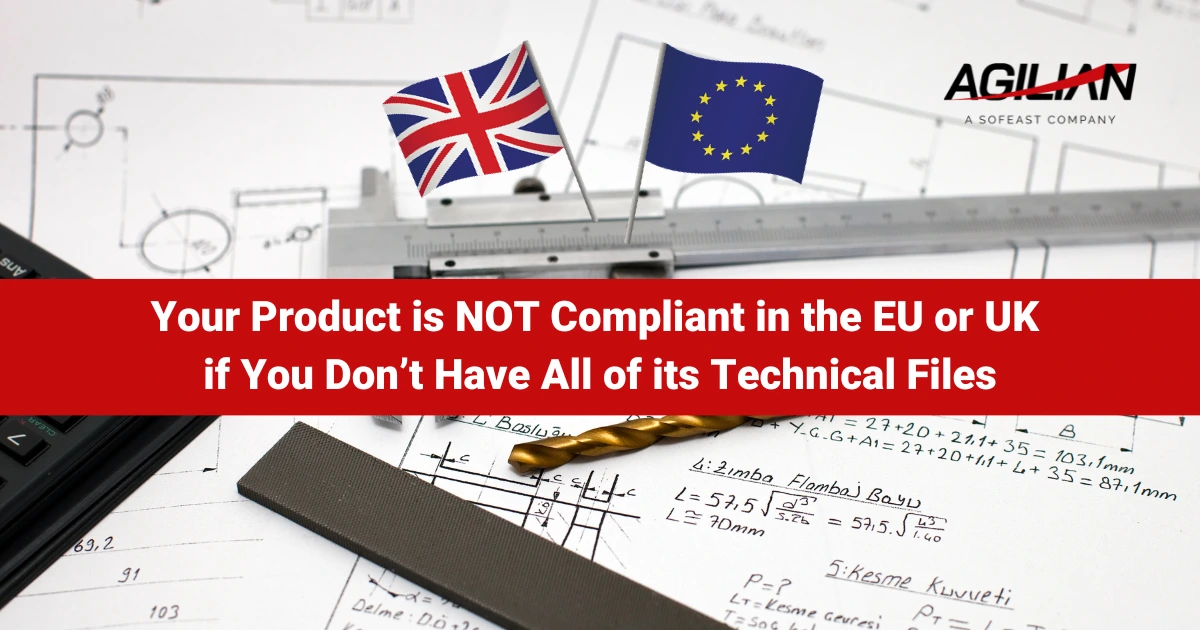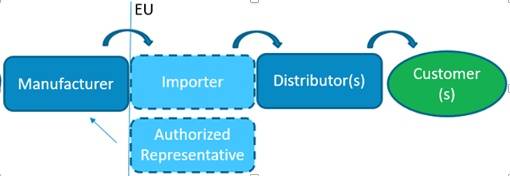
Market surveillance authorities around the world, in particular the EU and UK, are expecting to be provided with an increased amount of information from manufacturers of products these days. What does this mean for importers of products, even those who outsource to third-party manufacturers, and how does Agilian support you?
Understanding the Roles of the Economic Operators
Many importers may not even consider themselves to be the manufacturer if the real factory is an outsourced supplier in Asia, yet, as the importers of the products, it’s highly likely that you will be expected to produce documentation about the product’s components, safety and reliability testing results, etc, due to how the role of economic operators is defined:

An example scenario
- Company A has an idea for a product.
- Company B, a manufacturer in China, does most of the engineering design work and keeps the files to itself.
- Company A sells the product under its own brand and does not mention company B as the manufacturer on the product markings.
Company A is therefore considered as the “manufacturer” and bears a lot of obligations and liability.
To be considered the manufacturer, Company B which is located outside of the EU/UK would need to sell directly into the EU or UK through an authorized representative (a natural or legal person established in the region who they employ to act on their behalf to sell the product).
What sort of obligations and liability does a ‘manufacturer’ have?
The ‘manufacturer’ of the product could be fined if they fail to send technical documentation (including the complete list of components, the block diagram, the schematics, the drawings, the engineering changes if any, etc…) when a market surveillance authority asks for it.
Regulation 2019/1020 makes it clear that certain information about the product design and the supply chain must be available:
The powers conferred on market surveillance authorities under paragraph 1 shall include at least the following:
(a) the power to require economic operators to provide relevant documents, technical specifications, data or information on compliance and technical aspects of the product, including access to embedded software in so far as such access is necessary for the purpose of assessing the product’s compliance with applicable Union harmonisation legislation, in any form or format and irrespective of the medium of storage or the place where such documents, technical specifications, data or information are stored, and to take or obtain copies thereof;
(b) the power to require economic operators to provide relevant information on the supply chain, on the details of the distribution network, on quantities of products on the market and on other product models that have the same technical characteristics as the product in question, where relevant for compliance with the applicable requirements under Union harmonisation legislation;
…
Also, the products you sell must comply with applicable laws & regulations. For example, to the Low Voltage directive, to the Toy Safety directive, etc. (and each of them makes it very clear what documents are required).
In the worst case, the authorities may not allow the products to be sold and they’ll be stopped at the port of entry if you can’t provide these two types of information to them.
Should you wait until market surveillance authorities ask for that information?
In short, no.
The General Product Safety Regulation makes it clear:
Before placing their products on the market, manufacturers shall carry out an internal risk analysis and draw up technical documentation containing at least a general description of the product and its essential characteristics relevant for assessing its safety.
And, from about 2025, the upcoming Ecodesign for Sustainable Products Regulation will require that a digital product passport (think of a QR code) be affixed on each product, with a link to the technical folder, which will partially be behind a password. This will reinforce the requirement that the technical files must be ready before importing products into the EU.
Warning: working with certain Asian suppliers may prevent you from collecting the necessary documentation…
1: Does your supplier provide you with full technical information?
Typically, an original manufacturer (especially in China) doesn’t want to share the product’s technical documentation if they are asked for it as they consider it their IP and business secret. This is a typical part of their business model, especially if they’re an ODM or OEM, but is often assumed rather than stated…this is quite opposite to the kind of business model followed in the West, which is more transparent (and how we work here at Agilian).
A regular Chinese factory’s thinking may be something like this:
“We helped the customer develop their product and paid for that work out of our own pocket, so we ‘own’ the subsequent technical information such as Bill of Materials, etc.”
There is some logic here. Let’s say you’re adding your brand name to a white-label toaster, for example. You didn’t design or develop the toaster, the manufacturer did, so it’s more reasonable for them to claim ownership of its IP.
The problems start when you outsource the development and/or manufacturing of your product design to a supplier and they do the same thing, thereby assimilating your IP and making it their own.
2. Does your supplier provide details about the components?
Do Chinese suppliers provide supply chain information readily? No, they usually provide an overly simplified BOM and that’s it.
Why that’s a big problem? One reason is, visibility over safety-critical components is a must. For example, a mains fuse helps reduce the likelihood of serious safety hazards. The authorities will expect to see some form of testing and validation of those components, from a safety perspective. But what happens if your supplier can’t or won’t provide any information about which components were used and where they were obtained because it’s a ‘business secret?’
Need help?
If this topic is something you have questions about, contact us to have a conversation.
Disclaimer
We are not lawyers. What we wrote above is based only on our understanding of the regulatory requirements. Agilian Technology does not present this information as a basis for you to make decisions, and we do not accept any liability if you do so. Please consult a lawyer before taking any action.



